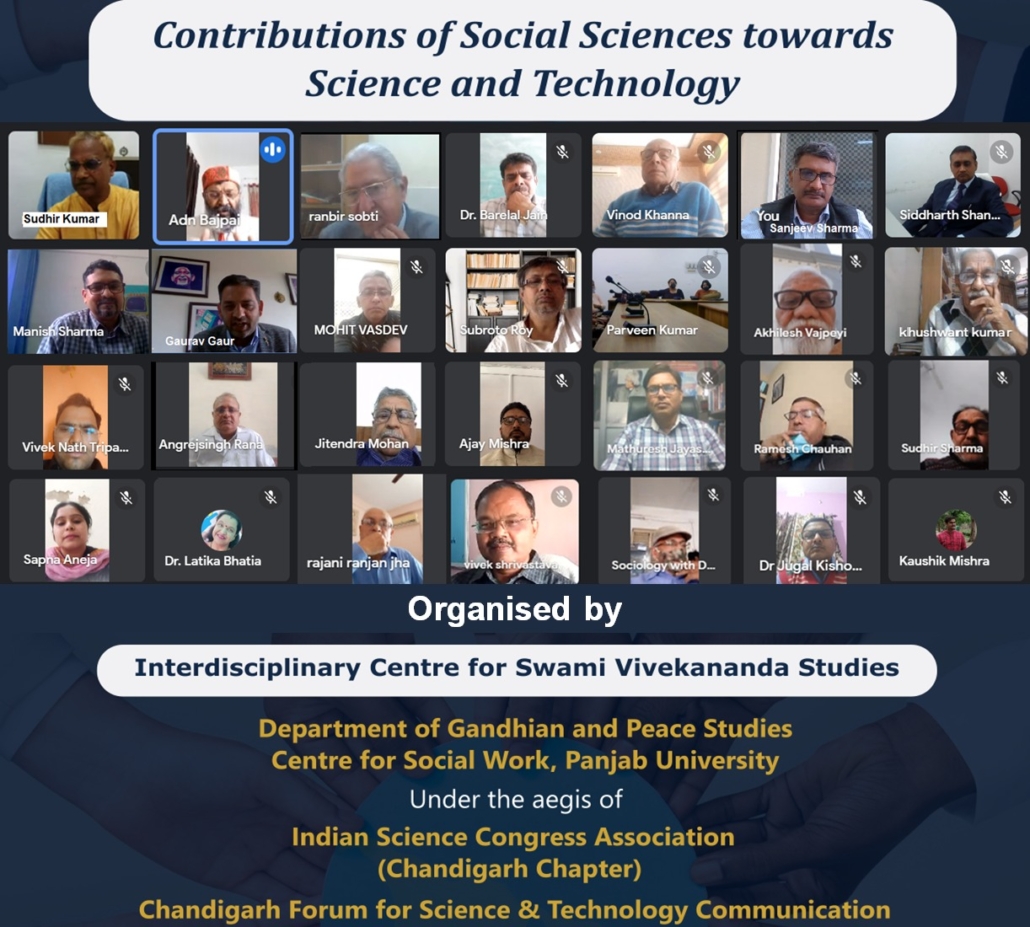Chandigarh March 5, 2022
Engaging seemingly unrelated disciplines of intellectual enquiry, traditional gaps in terminology, approach, and methodology are gradually getting eliminated. By removing roadblocks to potential collaboration, a true meeting of minds can take place which can give rise to new hybrid disciplines of study. These views were expressed by Prof A D N Bajpeyi, Vice Chancellor, A.B. Vajpayee University, Bilaspur (Chattisgarh). In his expository talk, Prof Bajpeyi made earnest appeal for drawing inspirations from rich reservoir of traditional Indian knowledge systems. Elucidating with numerous commentaries from Indian scriptures, Prof Bajpeyi in his seminal discourse outlined thatsocial sciences revolve around the behavior and societal norms. Social scientists are concerned with cultural and human contexts and try to explain how the world works. Their main aim is to study the complex and ever-changing phenomena that occur in human and social life as well as their interactions with one another.
The celebrated author noted that interdisciplinary research figures high on India’s New Education Policy agenda. As scientific knowledge in a wide range of disciplines has advanced, Indian scholars have become increasingly aware of the need to link disciplinary fields to comprehensively answer critical questions, or to facilitate application of knowledge in socially relevant fields. This recognition has stimulated a steadily growing interest within the academic community in developing new knowledge through research that combines the skills and perspectives of multiple disciplines for reducing socio-economic disparities.
Prof Bajpeyi made a passionate appeal to the academicians on need to produce researchers that not only ensure technological progress, but individuals with a strong background in values and with enough vision to meet new challenges in a sustainable manner.
Prof R C Sobti, Former Vice Chancellor of Panjab University, Chandigarh and Dr BBAU, Lucknow, in his presidential address highlighted that scientific developments have emerged out of human curiosity about the events and processes surrounding the mankind. The origin of the natural world is traceable to the renaissance age, when philosophers and sociologists started investigating how the world functioned and how can we improve quality of life. Society’s moral and ethical systems have always driven the quest towards scientific breakthroughs. Science, in its original concept, is at the service of humanity.
Prof Sobti made an impassioned appeal to adopt such a multi-pronged approach which is essential to the proper functioning of society and the world we live in. It is because of the synergistic contributions of all fields of enquiry to the body of knowledge that helps us understand ourselves better. Most branches of science and technology employ both natural and social science components. He highlighted that we are living in exciting times where knowledge flows and gets shared like never before.
Prof Sudhir Kumar, Dean Research, P.U. emphasised that the academicians have to move out of their colonial mindset and dismantle artificial silos of compartmentalised knowledge. We need to undertake research work that involves ideas and approaches from multiple disciplines of knowledge applied to solve a specific problem through cross fertilization of ideas. Creativity, analytical and problem solving skills, reflections, empathy skills are equally dependent on societal as well as scientific knowledge. It is ability of individuals to relate seemingly unrelated concepts and ideas and to develop a global vision of problems which has ensured that scientific breakthroughs take place.
Prof Manish Sharma, Chairperson, Department of Gandhian and Peace studies, welcoming the participants, highlighted that PU is consistently maintaining its leadership position in higher education and research on account of vibrant academic environment.
Prof Sanjeev Sharma, Coordinator, Interdisciplinary Centre for Swami Vivekananda Studies outlined the changing facets of teaching-learning processes at PU where emphasis is on sensitising students.to develop more global and pluralistic view of the problems. This helps in developing holistic perspective to harness skills to empathize with societal and ethical ramifications.
Dr Gaurav Gaur, Chairperson, Centre for Social Work, P.U. proposed a vote of thanks and acknowledged the contributions of such webinars in shaping the thought processes in the faculty and students. He highlighted that PU is making earnest efforts under the guidance of Prof Raj Kumar to ensure collaboration between different Departments of the university
The webinar was organised by Interdisciplinary Centre for Swami Vivekananda Studies, Centre for Social Work and Department of Gandhian & Peace studies under the aegis of Indian Science Congress Association (Chandigarh Chapter). It received enthusiastic response from more than 125 academicians and researchers.




